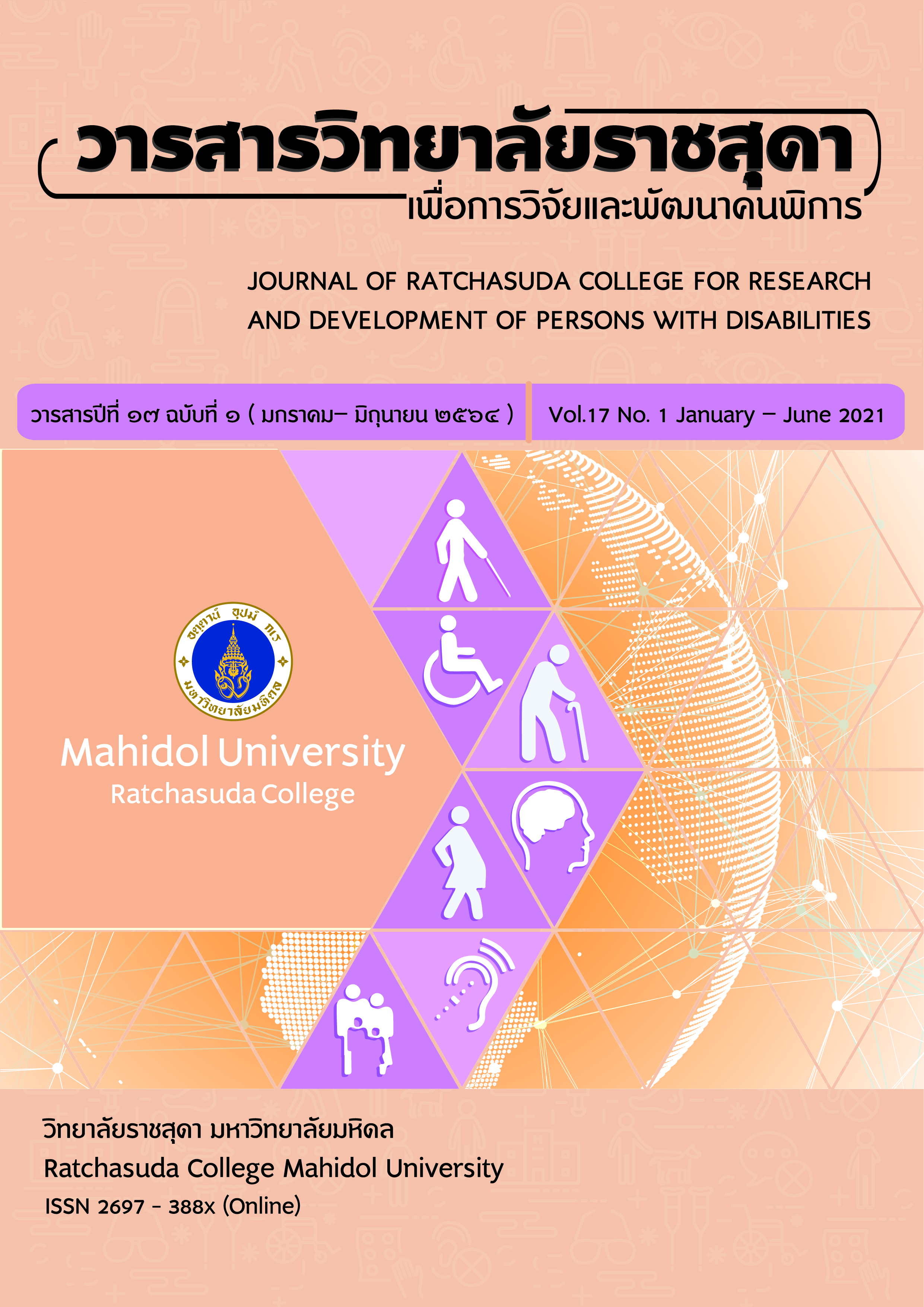The Development of a Curriculum to Enhance Independent Living Skills in Home for Children with Intellectual Disabilities
Keywords:
The development of a curriculum, Independent living skills in home, Children with intellectual disabilitiesAbstract
The purpose of this research was to develop a curriculum for enhancing independent living skills in home for children with intellectual disabilities. The target group are experts with specific experience working with children with intellectual disabilities and selected by purposive sampling. The data collection tools namely, the focus group recording form with content validity between 0.80 - 1.00 and in-depth interview with content validity equal to 1.00. The data analysis used content analysis method. The results of the research are as follows ; 1) At present, schools do not have specific curriculum concerning the enhancement of independent living skills in home for children with intellectual disabilities. In addition, teachers do not have guidelines for organizing learning activities. Expectations of persons concerned are in the high level, namely, children are able to help themselves. Moreover, to develop the curriculum that covers important house chores, such as cleaning the house, cooking, cleaning the container, laundry and cleaning a bathroom, guidelines should be introduced. 2) Developing the curriculum for enhancing independent living skills in home for children with intellectual disabilities has 4 components ; (1) the purpose of curriculum, (2) the contents, (3) learning management, and (4) measurement and evaluation. The results of curriculum assessment in utility, feasibility and appropriateness are in the highest level while accuracy is in high level.
Downloads
References
American Psychiatric Association. (2013). Diagnostic and statistical manual of mental disorders : DSM-5TM. Bangkok: Igroup press.
Bouck, E.C. (2010). Reports of life skills training for students with intellectual disabilities in and out of school. Journal of Intellectual Disability Research. USA : Purdue University [Online]. Retrieved November 23, 2019, from https://www.ncbi.nlm.nih.gov/pubmed/21105934
Bright Hub Education. (2010). Understanding the meaning of adaptive skills for special education students [Online]. Retrieved May 23, 2019, from https://www.brighthubeducation.com/special-ed-learning-disorders/73324-improving-adaptives-skills-in-students-with-intellectual-disabilities.
Chaloeywares, N. (2013). Metaevaluation: concepts and principles. Journal of Graduate Studies in Northern Rajabhat Universities, 3(4), 1 – 13. (in Thai)
Dollar, A.C., Fredrick, D.L., Alberto, A.P., & Luke, K.J., (2012) Using simultaneous prompting to teach independent living and leisure skills to adults with severe intellectual disabilities. Journal of Research in Developmental Disabilities, 33(2012), 189 – 195.
Pattaphol, M. (2015). Curriculum evaluation, Learning and development (3rd Ed.). Bangkok: Charan sanitwong printing. (in Thai)
Special Education Bureau. (2015). Living skills development program for children with special needs at the special education center B.E. 2015. Bangkok: Special education bureau.
Sutthirat, S. (2015). Curriculum development: Theory to practice. (4th Ed.). Bangkok: Weprint (1991) Company limited. (in Thai)
Taba, H. (1962). Curriculum Development: Theory and practice. New York: Harcourt Brace & World.
Tubtimteth, S. (2010). Independent living for people with disabilities: True stories or sparse dreams. Journal of Ramathibodi Medical Journal. 33(4), 297-298.
Tyler, R. W. (1971). Basic principles curriculum and instruction (31st ed). Chicago: The University of Chicago.
Wehman, P. & Kregel, J. (Ed.). (2020). Functional curriculum for elementary, middle, and secondary age students with special needs (4th ed.). Austin, Texas: Proed an International publisher.
Downloads
Published
How to Cite
Issue
Section
License
บทความที่ได้รับการตีพิมพ์เป็นลิขสิทธิ์ของวารสารสถาบันราชสุดาเพื่อการวิจัยและพัฒนาคนพิการ






